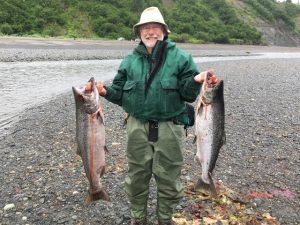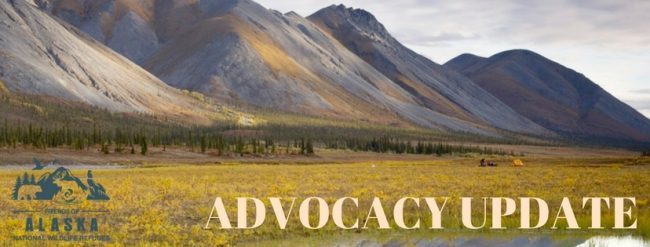By David Raskin, Friends President
Kenai Regulations
We were successful in forcing the DOI to reopen the comment period for 30 days beginning on October 9 and schedule a virtual hearing on October 26. See the lead article in this newsletter for details. This major effort was led by the Alaska Wilderness Alliance, Defenders of Wildlife, and Alaska Friends.
Arctic National Wildlife Refuge
We are still waiting to hear about the expected call of nominations for oil leases. The window is narrowing for this process to unfold before a new administration is installed in January.
The village of Kaktovik and the Arctic Slope Regional Corporation are exploring ways to drill for oil and gas on the inholdings in the Coastal Plain. They are planning to do seismic exploration this winter on their lands in the eastern area of the Coastal Plain. They will need to get permits from the USFWS, and the Arctic Refuge Defense Campaign (ARDC) and Friends will be monitoring any developments and will take action if needed.
The ARDC campaign’s highly successful meetings with financial institutions concerning the dangers of Arctic drilling and the financial risks of supporting such efforts reached another milestone with the announcement by the Royal Bank of Canada that they will not fund drilling in the Arctic Refuge. This is a major development that we hope will encourage other Canadian financial institutions to take this step to protect the arctic and their people who depend on it for subsistence and traditional ways of life. ARDC has continued their pressure on Bank of America and oil and gas development companies to join the major financial institutions in refusing to fund oil development in the arctic.
Izembek National Wildlife Refuge
The latest development is a refurbished effort by the State of Alaska to obtain a road right-of-way to connect inholdings in King Cove with Cold Bay. This is a new tactic to represent individual landowners in King Cove that is very complicated and hopefully will fail to meet the requirements for standing. The State has been interested in doing this for many years, and Trustees for Alaska had addressed this in our recent lawsuits. We feel that it has little chance of success and remain vigilant for any attempts by the State and the Alaska delegation to sneak something through.
Pebble Mine
The Pebble Partnership took a big hit following the disclosures of their behind-the-scenes antics that provoked the ire of Senator Sullivan and others. We hope that the Army Corps of Engineers will stick to their recent position that the Pebble Project failed to provide satisfactory mitigation plans for the proposed mine. The Corps gave the Pebble project 90 days to propose stream and wetland mitigation plans, but it seems unlikely that they will be able to put together such a plan because of lack of options.
Mulchatna Caribou
The Mulchatna caribou herd has experienced declining populations for several years. It ranges over a huge area of Western Alaska that encompasses large portions of the Togiak and Yukon Delta Refuges. The State is asking to extend its current, unsuccessful predator control activities to lands within the refuges. However, this is not consistent with FWS management practices and is unlikely to achieve the State’s hopes of increasing the caribou population. Declines in the caribou numbers are most likely due to human predation and smaller impacts of habitat loss and other factors, and FWS is not likely to allow the State to kill predators on refuge lands.
